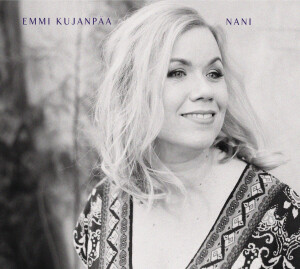 Finnish folk singer, composer, teacher and researcher Emmi Kujanpää continues her ongoing exploration of the intersection of Finnish and Balkan music with her first “solo” recording Nani. I put solo in quotes because this album includes the contributions of the Le Mystère des Voix Bulgares Vocal Academy choir as well as some Finnish guest musicians. But solo is also appropriate, for Emmi composed and arranged the music and wrote most of the lyrics on the album in Finnish, Karelian and Bulgarian, and produced it as well, at studios in Bulgaria and Finland, with recording assistance from Delian Ivanov and Mikael Hakkarainen.
Finnish folk singer, composer, teacher and researcher Emmi Kujanpää continues her ongoing exploration of the intersection of Finnish and Balkan music with her first “solo” recording Nani. I put solo in quotes because this album includes the contributions of the Le Mystère des Voix Bulgares Vocal Academy choir as well as some Finnish guest musicians. But solo is also appropriate, for Emmi composed and arranged the music and wrote most of the lyrics on the album in Finnish, Karelian and Bulgarian, and produced it as well, at studios in Bulgaria and Finland, with recording assistance from Delian Ivanov and Mikael Hakkarainen.
The most important thing about it is that it is beautiful.
After graduating from the world-renowned Sibelius Academy as well as the University of Helsinki, and doing graduate work at the Academy of Music, Dance and Fine Arts in Plovdiv, Bulgaria, this Finnish folk singer, kantele player, composer and researcher produced an album by Finno-Balkan Voices in 2014. That ensemble combined the Finnish group Mamo and the Vaya Quartet from Bulgaria. One of the members of that group was Prof. Dora Hristova, who leads the popular Le Mystère des Voix Bulgares ensemble, and the two have continued working together, which leads us to Nani.
On this project, Kujanpää combines her strong, clear soprano with voices of the Bulgarian group on songs that address women’s lives – their joys and longing and sorrows, as well as what are now known worldwide as #MeTo topics.
The album gets more varied and even wilder as it goes on. The first three tracks are vocal only, either Kujanpää solo or with choral backing like the opening song “Ogrejalo slantse – Vuota vuota.”
Then “Celestia” features Kujanpää playing the Finnish zither called the kantele, at first unaccompanied then with the choir. On “Milenkalle – A Song For Milenka” she’s joined by Jarkko Niemelä on trumpet in a lovely voice-horn duet that ends in a chilling dissonant harmonic. “Milenka” nicely combines kantele, trumpet and voice, and things get progressively more exotic from there. “Kuutar – The Goddess Of The Moon” finds Kujanpää playing something called jewelry percussion to accompany voices both solo and choral. She sings alone on the Romanian-sounding “Sirkus Savonia,” accompanied by trumpet and Eero Grundström on harmonium plus some kind of percussion, as the tune gets faster and faster and she’s joined by Niemela and Grundstrom on vocals. Sauli Heikkilä contributes on “Laulajan Loitsu,” playing the Morin khuur, the Mongolian “horsehead fiddle” as well as Tuvan throat singing, and the album wraps up on a dramatic Finnish-Bulgarian choral piece with kantele called “Yoik Of A White Night.”
The CD comes with a 12-page booklet that has each song’s lyrics in its original language and an explanation in English. Fans of Balkan and Nordic song should definitely give Nani a listen.
(Nordic Notes, 2020)
